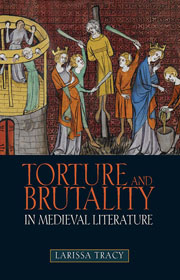Book contents
- Frontmatter
- Contents
- Acknowledgements
- Abbreviations
- Introduction
- 1 Rending the Flesh: The Orthodoxy of Torture in Hagiography
- 2 Resisting the Rod: Torture and the Anxieties of Continental Identity
- 3 The Matter of the North: Icelandic Sagas and Cultural Antonomy
- 4 The Matter of Britain: Defining English Identity in Opposition to Torture
- 5 Laughing at Pain: The Comic Uses of Torture and Brutality
- 6 Medieval Torture and Early-Modern Identity
- Conclusion
- Select Bibliography
- Index
6 - Medieval Torture and Early-Modern Identity
Published online by Cambridge University Press: 05 September 2013
- Frontmatter
- Contents
- Acknowledgements
- Abbreviations
- Introduction
- 1 Rending the Flesh: The Orthodoxy of Torture in Hagiography
- 2 Resisting the Rod: Torture and the Anxieties of Continental Identity
- 3 The Matter of the North: Icelandic Sagas and Cultural Antonomy
- 4 The Matter of Britain: Defining English Identity in Opposition to Torture
- 5 Laughing at Pain: The Comic Uses of Torture and Brutality
- 6 Medieval Torture and Early-Modern Identity
- Conclusion
- Select Bibliography
- Index
Summary
‘The movements grow, gathering simple people who have been aroused by other movements and who believe all have the same impulse of revolt and hope; and they are destroyed by the inquisitors, who attribute to one the errors of the other, and if the sectarians of one movement commit a crime, this crime will be attributed to each sectarian of each movement. The inquisitors are mistaken, rationally speaking, because they lump contradictory doctrines together.’
Brother William of Baskerville, The Name of the Rose, Umberto Eco (p. 235)The condemnation of excessive brutality and judicial torture prevalent in medieval literature is among the lasting legacies of the Middle Ages. As European society progressed through the tumultuous fifteenth century and into the early-modern period, the image of brutality as a signifier of medieval barbarity was reimagined in literature and on stage as torture gained a foothold in English jurisprudence. What many early-modern audiences perceived as a ‘medieval’ practice actually climaxed in the religious and political struggles of the sixteenth century. In the Preface to his History of the World (1614), Sir Walter Ralegh commented that ‘whosoever in writing a modern History, shall follow truth too near the heels, it may happily strike out his teeth … It is enough for me … to write of the eldest times: wherein also why may it not be said, that in speaking of the past, I point at the present, and tax the vices of those that are yet living, in their persons that are long since dead’.
- Type
- Chapter
- Information
- Torture and Brutality in Medieval LiteratureNegotiations of National Identity, pp. 243 - 291Publisher: Boydell & BrewerPrint publication year: 2012



